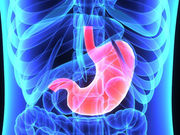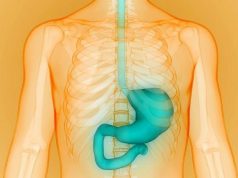Greatest reduction in risk seen for patients also taking antiplatelet drugs or NSAIDs
FRIDAY, Dec. 23, 2016 (HealthDay News) — For patients beginning warfarin therapy, proton pump inhibitor (PPI) co-therapy is associated with reduced risk of upper gastrointestinal bleeding, according to a study published in the December issue of Gastroenterology.
Wayne A. Ray, Ph.D., of the Vanderbilt University School of Medicine in Nashville, Tenn., and colleagues conducted a retrospective cohort study of patients in Tennessee Medicaid and the 5 percent National Medicare Sample. A total of 97,430 new episodes of warfarin treatment were identified, with follow-up of 75,720 person-years.
The researchers found that there were 119 hospitalizations for upper gastrointestinal bleeding per 10,000 person-years of treatment among patients who took warfarin without PPI co-therapy. Patients who received PPI co-therapy had a 24 percent decreased risk (adjusted hazard ratio, 0.76; 95 percent confidence interval, 0.63 to 0.91). In this group there was no significant reduction in the risk of other gastrointestinal bleeding hospitalizations or non-gastrointestinal bleeding hospitalizations. For patients concurrently using antiplatelet drugs or nonsteroidal anti-inflammatory drugs (NSAIDs), there were 284 upper gastrointestinal bleeding hospitalizations per 10,000 person-years of warfarin treatment for those without PPI co-therapy. With PPI co-therapy the risk was reduced by 45 percent (hazard ratio, 0.55; 95 percent confidence interval, 0.39 to 0.77). For patients not using antiplatelet drugs or NSAIDs, PPI co-therapy had no significant protective effect (hazard ratio, 0.86; 95 percent confidence interval, 0.70 to 1.06).
“PPI co-therapy was associated with reduced risk of warfarin-related upper gastrointestinal bleeding,” the authors write.
Full Text
Copyright © 2016 HealthDay. All rights reserved.








